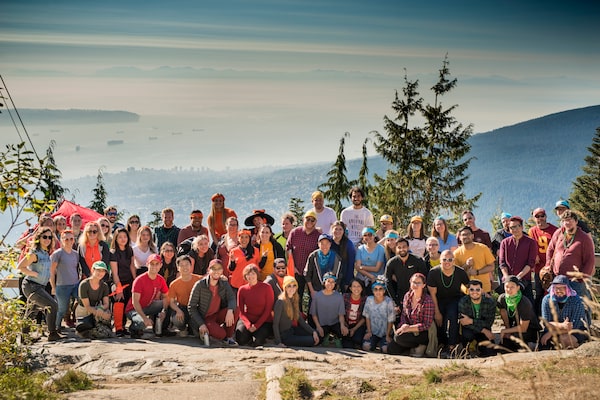Greg Smith took his first “bleisure” trip long before hearing the term – it means business travel with extra time for fun.
A few years after starting Vancouver-based Thinkific – a software company that helps users create, sell and deliver their own online courses – with his brother Matt in 2012, they decided to hold their first board meeting on a little island in Indonesia. For a month, they brought out their laptops daily to work side by side while fitting in some scuba diving lessons and beach time. Matt Smith even climbed a volcano.
The results were surprisingly productive.

Greg Smith, chief executive officer of Vancouver-based Thinkific, endorses bleisure trips not just for the company's top leaders and their families but also for its employees.ReillyLievers-info@jerkwithacamera.c
“All the things that inspire creativity – a change of environment, a bit of relaxation for your brain, having different stimuli and just the time to think – worked for us,” says Greg Smith, who is the company’s chief executive officer. “When we came home from that trip we had a really good idea of where we wanted to go in the business and hit the ground running.”
About 37 per cent of North America-based business travellers have extended a work trip for leisure, according to a 2017 study from the Global Travel Business Association. That number will likely rise in the future, however, as millennials, those ages 22 to 35, combined business and pleasure at a much higher rate of 48 per cent (baby boomers had the lowest figure, at 23 per cent).
Mr. Smith endorses bleisure trips not just for Thinkific’s top leaders and their families – a recent meeting in Hawaii included kite-boarding – but also for the company’s employees, who can add fun time to their business trips or make an extra stop on the way home to visit family.
"As we become more connected with technology and expect faster and faster response time, people are looking for something to counterbalance that,” says Mr. Smith, who says he wouldn’t have felt comfortable asking for extra days on a trip when he was employed as a lawyer 10 years ago.
Although bleisure trips are probably easier to do at the leadership level because the control, decision making and budgets are there, Mr. Smith believes companies that adopt it at all levels will benefit. “It really should be happening throughout an organization,” he says. “Not just for retention but for general mental health and happiness.”

Employees of Thinkific participated in a scavenger hunt on B.C.'s Grouse Mountain during a company retreat.ReillyLievers-info@jerkwithacamera.c
As a lawyer who practised corporate securities law, Mr. Smith cautions that there are ethical and even legal and tax components to bleisure trips. If a portion of your trip is exclusively for personal benefit, then you have to consider your shareholders and the government in that there’s potentially a taxable benefit that must be accounted for.
“Is the business paying for it?” Mr. Smith asks. “In that case, it’s probably a benefit to me and should be disclosed to both government and shareholders or whoever is making compensation decisions. That should be a conscious choice by the business. If the business is not paying for it, then it’s just me extending my trip and paying for it myself.
"There are no crystal clear lines on this stuff, like a lot of things on ethics.”
Patrick Doyle, vice-president and general manager at American Express Global Business Travel Canada in Toronto, believes it’s only complicated if your business hasn’t thought the policy through. His company helps other firms develop standard practices on blending business and corporate travel, such as allowing the extension of one’s stay for personal reasons or adding days to the hotel that was booked.
Another consideration is what’s called “duty of care,” which means preserving the safety and security of travellers. For example, when a traveller wants to extend a trip, or bring along a spouse or family member, there are insurance questions to be addressed. Some companies offer insurance for the extension of business trips that become leisure trips, but it’s not common, Mr. Doyle says.
“If you know you want to allow [bleisure travel], and you’ve drafted a policy or guidelines around it, it’s not that complex,” he says. “Five years ago there really wasn’t clarity on what an employee could or couldn’t do. But now companies are ... being clear on how they will address it.”
Like Mr. Smith, Mr. Doyle has taken his own bleisure trips. He arrived early in Madrid for a recent business trip so he could get a sense of the city before beginning work.
He also sees bleisure playing into the war for talent and as a retention strategy for employees, particularly those younger than 40. Personalized travel policies have become an important recruitment and retention tool, and job candidates are going out of their way to ask about them and making decisions based on what they hear, according to a 2018 study from the Association of Corporate Travel Executives and American Express Global Business Travel.
“It’s a part of what people are expecting in a compensation plan, benefits or a travel policy,” Mr. Doyle says. “From my experience in working across Canadian businesses, I think it’s going right down to associate levels in organizations, so it’s not contained at a C-suite level.
"As you look at younger travellers, it fits with what their lifestyle is and with what they want to do.”